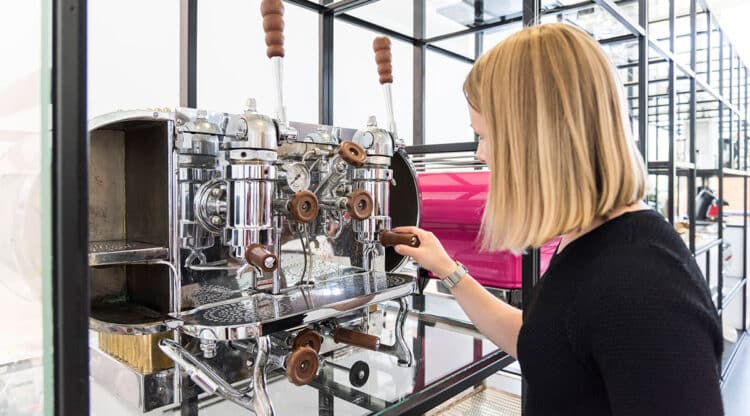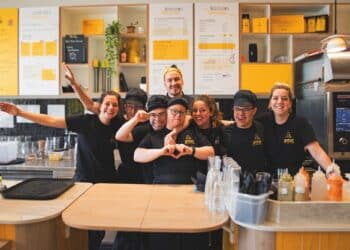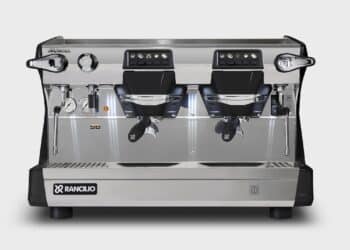Coffee is a multi-dimensional product, with facets and interests in it ranging from agriculture and chemistry to culture and the economy. It’s these numerous aspects that the Deutsches Museum in Munich explores in its special Cosmos Coffee exhibition, which made its debut in July 2019. Exhibition curators Sara Marquart and Melanie Jahreis say Cosmos Coffee takes an emotionally and sensually engaging approach to coffee. “Millions of people consume coffee on a daily basis, but few understand the beauty, complexity, and diversity of the product,” Marquart tells Global Coffee Report. “We really want to highlight the people behind coffee – from the farmer to roaster, manufacturer, barista, and consumer.” Cosmos Coffee consists of 198 displays, 22 multimedia stations, and 16 interactive installations across 800 square metres. The exhibition is divided into five categories – biology, chemistry, technology, economics, and the culture surrounding coffee. Among its interactive installations is a 50-square-metre augmented reality coffee forest, where guests can experiment with growing varietals under different conditions. “The coffee forest includes three sets of growing conditions – a Brazil-type open sun plantation, shade-grown production, and an Ethiopian wild coffee forest,” Marquart says. “Some coffees may be simpler to care for while others can be quite divas – demanding a lot of sun and water. It teaches guests that coffee is not easy to grow.” Exploring the chemistry of coffee is a gas chromatography station, which transforms visitors from bystanders into coffee scientists. “Coffee’s aroma consists of 23 to 28 compounds, which can be split and looked at individually,” Marquart says. “Visitors can act like food chemists, analysing that composition and identifying different aromas, whether they be pleasant like blackcurrant or less so, like rotten garlic.” After analysing the bean, guests can learn about its processing, with interactive roasting sessions run frequently using a Neuhaus Neotec fluid bed roaster and app-driven Ikawa benchtop roaster. Guided events are also held with a Probat drum roaster. “People can roast their own coffee and see the changes in the bean as it moves through different stages, pick up the different smells, and feel the difference between the green and roasted coffee,” Marquart says. After mastering the ups and downs of the roasting curve, visitors can turn to the Coffee Maker Shelf, where 40 coffee machines are on display, which Marquart says each represent milestones in the technology’s development. “The equipment ranges from the first Bialetti Moka pot and Faema E61 espresso machine to fully automatics from the likes of Jura,” she says. “La Marzocco also made us an ‘explosion model’ of its Leva, allowing people to see inside the espresso machine and how much technology – boilers, microchips, and brewing groups – is hidden beneath the covers.” After exploring coffee equipment, the exhibit looks behind the scenes to the financial realities of the coffee market. “We draw attention to the current price crisis, which is a reality for farmers who do not get a good wage for what is hard labour,” Marquart says. One way the exhibit makes this topic approachable is a multimedia stock exchange station, where attendees can simulate trading coffee as it is on the New York Stock Exchange. “They can see, for example, how frosts or natural disasters like landslides and tsunamis will affect the coffee price and just how volatile the market can be,” Marquart says. Following this economic crash course, Cosmos Coffee turns to the culture that has developed around the bean, beginning with how it migrated from Ethiopia to the rest of the globe. “We want to not only show how the plant and beverage spread around the world, but the cultures and practices that evolved around it,” Marquart says. With coffee being a topic with global appeal, Marquart and the Deutsches Museum hope to take Cosmos Coffee on the road from June 2020. “We are currently in communication with Singapore and Tokyo and are on the lookout for any parties interested in staging Cosmos Coffee,” Marquart says. “We want people around the world to drink coffee with joy but also awareness, and see the people, science, and society behind it.” For more information, visit www.deutsches-museum.de/en Follow Global Coffee Report on LinkedIn, Facebook, and Twitter for up-to-date news and analysis of the global coffee industry.
Creating coffee opportunities with Café Joyeux
Co-Founder and CEO Yann Bucaille-Lanzerac reveals how Café Joyeux uses coffee as a vehicle to create opportunities for people with...





